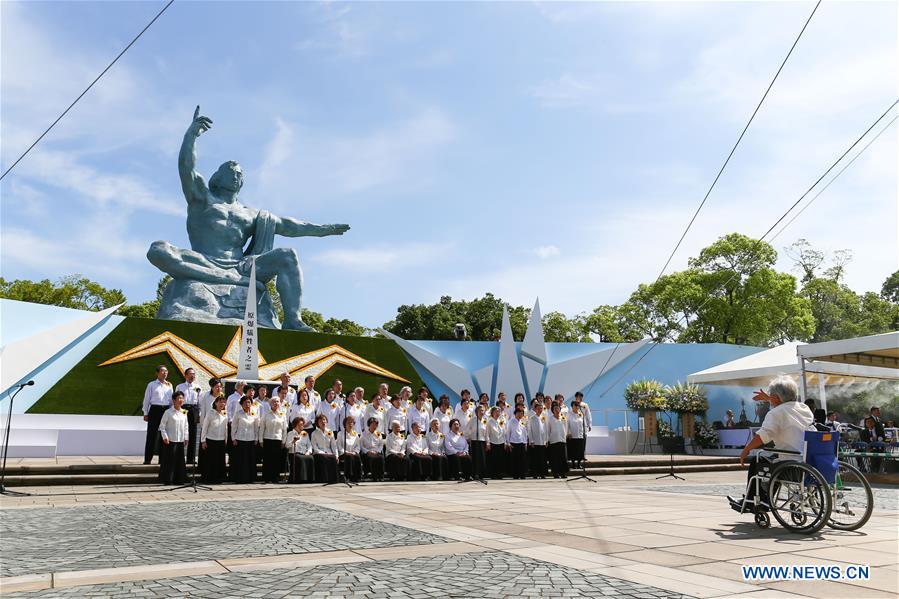
A chorus sing during the 73rd anniversary of the U.S. atomic bombing of Nagasaki City in Nagasaki City, Japan, on Aug. 9, 2018. Nagasaki City in Japan commemorated the 73rd anniversary of the U.S. atomic bombing on Thursday, with its mayor urging the Japanese government to support an international nuclear ban treaty which came into effect last year. (Xinhua/Ma Caoran)
TOKYO, Aug. 9 (Xinhua) -- Nagasaki City in Japan commemorated the 73rd anniversary of the U.S. atomic bombing on Thursday, with its mayor urging the Japanese government to support an international nuclear ban treaty which came into effect last year.
"I hereby ask that the government of Japan, the only country to have suffered from the wartime use of nuclear weapons, support the Treaty on the Prohibition of Nuclear Weapons and fulfill its moral obligation to lead the world towards denuclearization," the Mayor of Nagasaki, Tomihisa Taue, said in his peace declaration.
U.N. Secretary General Antonio Guterres by attending the commemorative event and observations became the first sitting chief of the international body to attend the ceremony which is held every year, with the peace declaration also calling on global leaders to eliminate nuclear weapons.
The declaration urged global leaders to remember "the resolve" of the first U.N. General Assembly resolution to aim for the elimination of nuclear arsenals.
"To the great concern of those in the atomic-bombed cities, a shift towards openly asserting that nuclear weapons are necessary and that their use could lead to increased military might is once again on the rise," the declaration also said.
At 11:02 a.m. local time, a moment's silence was observed by those attending the ceremony as this was the time when a U.S. B-29 bomber dropped a plutonium-core atomic bomb, nicknamed "Fat Man," killing around 74,000 people in Nagasaki by the end of that year.
The atomic bombing of Nagasaki follows one dropped on Hiroshima on Aug. 6, with both bombings a means of accelerating the end of World War II and forcing Japan to surrender without a land invasion that would have claimed many, many more lives as experts attest.
Taue went on to say that the two atomic bombed cities of Hiroshima and Nagasaki have high hopes for "irreversible denuclearization."
The mayor urged the Japanese government to use the opportunity to create a nuclear-free zone in Northeast Asia.
Guterres, in his speech, meanwhile, called on all nations to commit to nuclear disarmament and urgently make "visible" progress.
"Disarmament processes have slowed and even come to a halt," Guterres said, intimating that the adoption last year of the Treaty on the Prohibition of Nuclear Weapons had shown the frustration that many countries had been feeling.
Prime Minister Shinzo Abe, for his part, said in his speech that "in recent years, differences in the approaches of various countries on nuclear disarmament have become evident."
He went on to say that Japan will serve as a bridge between nuclear powers and non-nuclear states, and that "an accurate understanding of the tragic realities of the atomic bombings and cooperation from both parties is essential."
While Japan this week inwardly looks at the tragedies it has experienced at the end of WWII, historians and political minds of the international community have encouraged Japan to come to see themselves not as merely victims of the atomic bombings but also as the perpetrators who led to these tragic incidents to happen in the first place.
Japan brutally occupied many parts of Asia before and during World War II, causing untold suffering and death to hundreds of thousands of innocent victims.
One fact, for example, that is finally garnering more and more attention around the world due to TV documentaries and scholars' research is the Japanese army's notorious Unit 731.
The unit was set up in the Pingfang district of Harbin, the largest city then in northeast China, in around 1936 and conducted vivisection experiments on live human beings to test germ-releasing bombs and chemical bombs among other criminal atrocities.
The unit became Japan's top-secret biological and chemical warfare research base and operated as the nerve center of Japanese biological warfare in China and Southeast Asia during World War II.
At least 3,000 people were used for human experimentation by Unit 731 along with a small percentage of Soviets, Mongolians, Koreans, and soldiers of the Allied Forces who had been taken captive. Some of those killed in ways unimaginable were just children.
More than 300,000 people across China were killed by Japan's biological weapons during WWII.
The notorious Unit 731 managed to keep its atrocities largely concealed due to the International Military Tribunal for the Far East not prosecuting the unit's commanders under condition they handed over the germ warfare data to the United States.
Right wing forces here have also, since the unit's abominable crimes committed before and during WWII, attempted to sequester the facts of the unit, going as far as denying its actual existence, despite an NHK documentary drawing local and international attention to the travesties and the names and positions of hundreds of those working at the unit being officially released recently.
Undoubtedly, the events that took place in Hiroshima and Nagasaki were tragic, but there were numerous more heinous incidents carried out by the Japanese army, that until this day, have received far less coverage in educational textbooks, or in globally televised memorial services.











